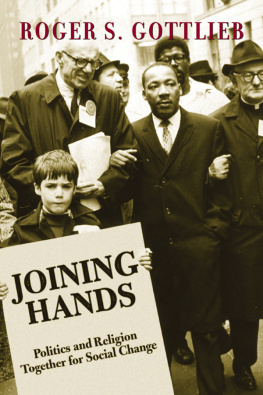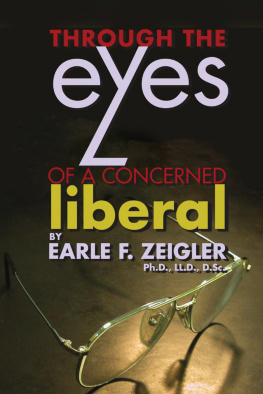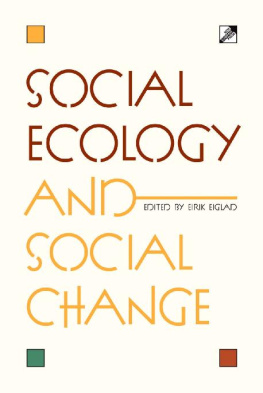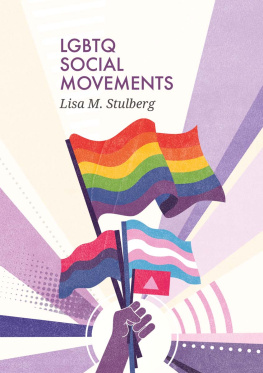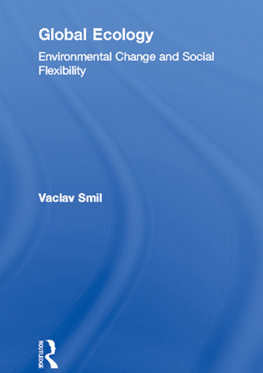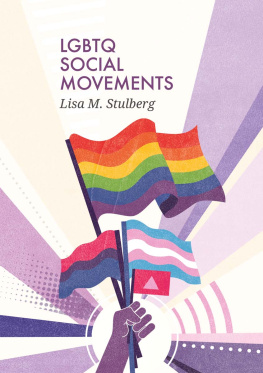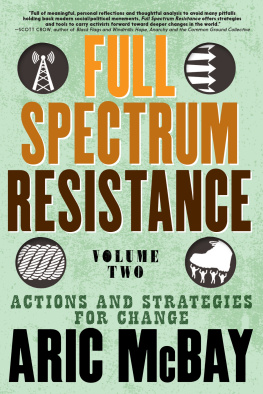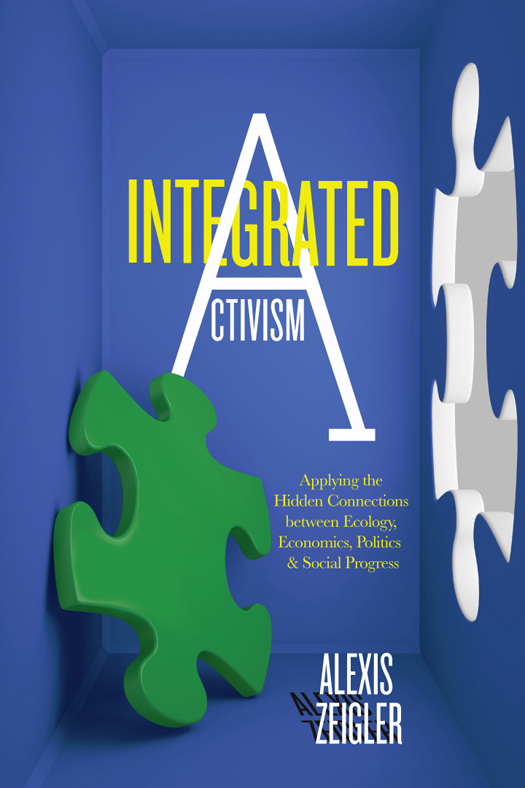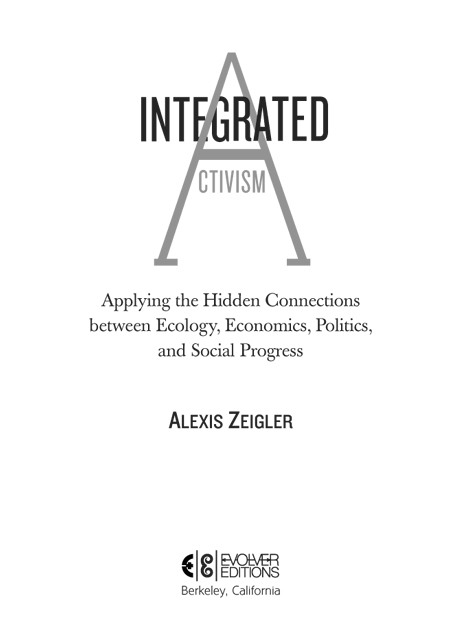Copyright 2013 by Alexis Zeigler. All rights reserved. No portion of this book, except for brief review, may be reproduced, stored in a retrieval system, or transmitted in any form or by any meanselectronic, mechanical, photocopying, recording, or otherwisewithout written permission of the publisher. For information contact Evolver Editions c/o North Atlantic Books.
Published by Evolver Editions,
an imprint of North Atlantic Books
P.O. Box 12327
Berkeley, California 94712
Cover art Marynchenko Oleksandr/shutterstock.com
Art direction and cover design by
michaelrobinsonnyc.com
Integrated Activism: Applying the Hidden Connections between Ecology, Economics, Politics, and Social Progress is sponsored by the Society for the Study of Native Arts and Sciences, a nonprofit educational corporation whose goals are to develop an educational and cross-cultural perspective linking various scientific, social, and artistic fields; to nurture a holistic view of arts, sciences, humanities, and healing; and to publish and distribute literature on the relationship of mind, body, and nature.
North Atlantic Books publications are available through most bookstores. For further information, visit our website at www.northatlanticbooks.com or call 800-733-3000.
The Library of Congress has cataloged the printed edition as follows:
Zeigler, Alexis, 1966
Integrated activism : applying the hidden connections between ecology, economics, politics, and social progress / Alexis Zeigler.
pages cm
Summary: Explains why peak oil, climate change, and the limits to growth affect abortion rights, workers rights, and civil liberty. The age of fossil fuel is giving way to the age of localized empowerment. We have real problems. This book offers real answersProvided by publisher.
eISBN: 978-1-58394-619-0
1. Social actionUnited States. 2. Political participationUnited States. 3. Global environmental changePolitical aspects. 4. Global environmental changeSocial aspects. I. Title.
HN65.Z42 2012
361.20973dc23
2012038964
v3.1
This book is dedicated to Rosa.
For the sake of future generations, we must fight.
Never let them tell you they didnt know.
Acknowledgments
I would like to thank the staff of the University of Virginia Library system for relentless and selfless research assistance over the span of years necessary for the completion of this book. For editorial support, I would like to thank Debra Piesen, Emily Hall, and Piper Martin. For support in diverse matters mental and material, I would like to thank Keenan Dakota. For support in material logistics, I would like to thank Twin Oaks Community and the Fellowship for Intentional Community (ic.org).
Contents
C HAPTER 1
Our Story
E very culture has a story, an explanation of where the world came from, an ethical framework of appropriate behavior, an understanding of what it all means. Every culture believes its own cosmology, and believes it to be the only real story. Every culture believes the stories of other cultures to be wrong. Ultimately, the story each culture possesses is neither right nor wrong, but rather a lens through which the world is viewed. That lens may shine light on certain realms, while obscuring others from view. We in the Western industrial world have a story, and we are no less convinced of the rightness of our story than any culture that came before us.
Our story is about progress. The past, so our story goes, was dark, the present is better, and with the right technological advances, the future may be even brighter. Every culture has a resistance to accepting those things that contradict its story. We have a hard time comprehending, or accepting, things that contradict our story of progress.
We know the majestic trees of the great forests clean our air and water, and yet every day the destruction of the Earths forests to build roads and cities continues. We can see the terrible tragedies that have befallen our forbearers, the great civilizations that left only deserts where fertile forests and fields once were. We can calculate the amount of topsoil on a field, and in the world. And still that soil continues to erode. The number of species alive on the planet declines every day. Precious genetic material is being lost, never to be recovered. How could it be that we know so much, and still we are powerless to stop the decline of the global environment?
Global oil production will peak sometime soon, with enormous consequences for modern industrial society, and yet we are making no significant preparations. We are facing a looming energy crisis, and yet we have access to more energy, more resources, by several orders of magnitude, than any of our forbearers. How could we have so much energy at our disposal and still be facing a crisis?
Climate change is another threat to our future that we, particularly in the United States, have not begun to address. And yet we know the answers. We have the conservation technologies, many of them quite ancient. We see how other people can and have lived using much less energy. We know about the problems, we see the solutions, and yet somehow we are collectively paralyzed to act.
For decades global living standards were improving. Now, because of debt, increases in oil and food prices, environmental degradation, and political unrest, modern society is polarizing into the very rich and the very poor. This is impacting the life expectancy and living standards in much of the less developed world. At the turn of the twenty-first century, the number of hungry people in the world was declining. In the last few years, it has started increasing. There exists in the world more than enough food, medicine, and materials to feed, clothe, and house all of humanity. And still the resources are misappropriated. We know how to be kind to each other, how to take care of family and friends when they are in need. Is that not the lesson that our species learned millions of years ago, living in social bands? And still millions of the human family are somehow outside of our family, removed from any such compassion.
In the United States, the movement to limit womens access to contraception and sexual liberty seems to move forward with an unstoppable momentum. The incremental dismantling of the welfare state continues in favor of an ever-expanding prison population. Once fringe fundamentalist movements now assert power in the political forum, with disturbing parallels between those who would impose Islamic law abroad and those who would impose a self-defined Christian law at home. We have seen democracy succeed and spread, unevenly, but inexorably, to include more and more people. How could it be, after democracy has triumphed over so many challenges, that it would be giving way now to fundamentalists and extremists, each calling the other devils, even as they each use the same means and methods to restrict freedom, to undermine democracy? How could it be that we know so much, and yet we are facing profound social and ecological crises, seemingly impaired to act?
Our inability to collectively respond to social and ecological problems is the result of a tradition of selective blindness we have inherited. Every culture rationalizes collective actions that conflict with stated moral norms. Particularly when it comes to morally dubious undertakings such as war, every culture makes up stories and chooses to see events in a manner that is comforting and alleviates moral conflict. Every culture chooses to not know particular things, to not openly recognize embarrassing moral conflicts. In the social realm, every human society chooses to know what it wants to know, and chooses to not know what it does not want to know.


